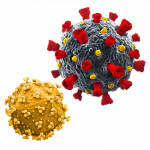What is a normal blood pressure?
According to the American Heart Association, a normal blood pressure is a systolic pressure (the top number) less than 120 and a diastolic pressure (the bottom number) less than 80—that is, 120/80 or lower.
A systolic number between 120 and 129 is considered elevated. A systolic number between 130 and 139 with a diastolic number between 80 and 89 indicates Stage 1 hypertension, while a systolic number of 140 or above with a diastolic number of 90 or higher is Stage 2 hypertension.
Experts estimate that between a third and nearly half of American adults have high blood pressure, which is more common among Black people. At early stages, it has no symptoms. Hypertension, one of the features of metabolic syndrome, increases the risk of cardiovascular disease, heart failure, stroke and vision problems.
What’s more, high blood pressure is associated with more severe COVID-19 complications. Smoking cessation, weight loss, exercise and a healthy diet can help lower blood pressure. If this is not enough, medications can help keep it under control.

Istoci
What is a normal body temperature?
A normal body temperature is usually said to be 98.6°F (37°C), but this varies from person to person, and it can fluctuate depending on your age, activities and the time of day. It also depends on the method used to measure it.
A temperature taken with a rectal or ear thermometer can be about a degree higher than an oral temperature, while an armpit or forehead measurement can be a degree lower. A reading between 97°F and 99°F is typical for an adult.
Fever is one of the most common symptoms of COVID-19. If you experience a fever after possibly being exposed to the new coronavirus, you should isolate yourself and be alert for worsening symptoms, especially difficulty breathing. When doing temperature screening for COVID-19, state and company guidelines use different thresholds for what is considered a fever, generally ranging from 99.5°F to 100.4°F.
Seek medical attention if your temperature is above 103°F (for an adult or a child age 3 or older) or if a fever lasts more than a few days.

Istoci
Why do cold temperatures bother me?
Sensitivity to the cold is one sign of an underactive thyroid gland, known as hypothyroidism. Other symptoms can include fatigue, weight gain, hair loss, constipation and dry skin. Ask your doctor to test your TSH and other thyroid hormone levels. This common condition can be treated with medication.
Anemia, abnormal blood vessel constriction (such as Raynaud’s syndrome) and low body weight can also cause a person to feel cold. However, individuals vary widely in their sensitivity to cold and heat, and this does not necessarily indicate a medical problem.







2 Comments
2 Comments